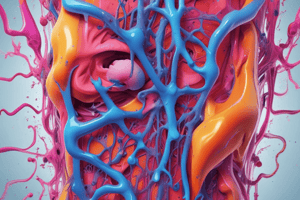Podcast
Questions and Answers
Which mechanism describes isotonic contraction in fluid deficit?
Which mechanism describes isotonic contraction in fluid deficit?
- Mainly sodium loss
- Fluid retention
- Mainly water loss
- Equal loss of sodium and water (correct)
What is a common clinical manifestation of hypovolemia?
What is a common clinical manifestation of hypovolemia?
- Edema
- Bulging fontanelles
- Increased urine output
- Decreased skin turgor (correct)
In cases of water deprivation, what type of contraction occurs?
In cases of water deprivation, what type of contraction occurs?
- Hypotonic expansion
- Isotonic contraction
- Fluid overload
- Hypertonic contraction (correct)
What condition may cause a significant loss of sodium relative to water?
What condition may cause a significant loss of sodium relative to water?
What is the primary treatment recommended for fluid deficit?
What is the primary treatment recommended for fluid deficit?
What is a significant characteristic of hypertonic contraction related to fluid deficit?
What is a significant characteristic of hypertonic contraction related to fluid deficit?
Which symptom is associated with the continuation of fluid volume loss?
Which symptom is associated with the continuation of fluid volume loss?
In the context of sodium loss related to fluid deficit, what best describes hypotonic expansion?
In the context of sodium loss related to fluid deficit, what best describes hypotonic expansion?
What laboratory analysis is critical to evaluate during fluid deficit treatment?
What laboratory analysis is critical to evaluate during fluid deficit treatment?
Which of the following is not a clinical manifestation of fluid deficit?
Which of the following is not a clinical manifestation of fluid deficit?
What physiological change occurs primarily during isotonic contraction due to fluid deficit?
What physiological change occurs primarily during isotonic contraction due to fluid deficit?
What common issue in fluid deficit typically affects sodium levels?
What common issue in fluid deficit typically affects sodium levels?
Which condition is often linked to dehydration and fluid deficit, leading to altered consciousness?
Which condition is often linked to dehydration and fluid deficit, leading to altered consciousness?
Which factor influences sodium alteration during fluid deficit the most?
Which factor influences sodium alteration during fluid deficit the most?
What symptom is characteristic of hypovolemia resulting from fluid deficit?
What symptom is characteristic of hypovolemia resulting from fluid deficit?
Flashcards are hidden until you start studying
Study Notes
Fluid Deficit: Overview
- Insufficient total body fluid to meet bodily needs.
- Primarily affects extracellular fluid (ECF) volume.
Mechanisms of Fluid Deficit
- Isotonic Contraction: Equal sodium and water loss; ECF volume decreases, osmolality unchanged. Often caused by diarrhea.
- Hypertonic Contraction: Primarily water loss; ECF volume decreases, osmolality increases. Water shifts from intracellular fluid (ICF) to ECF. Can result from water deprivation.
- Hypotonic Contraction: Primarily sodium loss; ECF volume decreases, osmolality decreases. Water shifts from ECF to ICF. Can occur with adrenal insufficiency. Commonly involves insufficient sodium intake alongside inadequate water intake.
Causes of Fluid Deficit
- Excessive water and sodium loss (e.g., diarrhea, vomiting, diuretics).
- Inadequate water and sodium intake.
Associated Electrolyte Imbalances
- Can occur independently or with hypernatremia or hyponatremia.
- Sodium changes depend on sodium content of lost fluid.
Clinical Manifestations
- Thirst.
- Altered consciousness (confusion, coma).
- Hypovolemia: Hypotension, orthostatic dizziness, tachycardia.
- Severe hypovolemia: Weak, thready pulse.
- Signs opposite to edema: Flat jugular veins, sunken fontanelles (infants), decreased skin turgor, dry mucous membranes, oliguria, weight loss.
Treatment and Diagnostics
- Laboratory tests: Complete blood count (CBC), chemistry profile, stool sample (C. difficile testing).
- Fluid replacement.
Fluid Deficit Overview
- Insufficient total body fluid to meet bodily needs.
- Primarily affects extracellular fluid (ECF) volume.
Types of Fluid Deficit
- Isotonic Contraction: Equal water and sodium loss; ECF volume decreases, osmolality unchanged. Often caused by diarrhea.
- Hypertonic Contraction: Primarily water loss; ECF volume decreases, osmolality increases. Water deprivation is a common cause. Fluid shifts from intracellular fluid (ICF) to ECF.
- Hypotonic Contraction: Primarily sodium loss; ECF volume decreases, osmolality decreases. Fluid shifts from ECF to ICF. Adrenal insufficiency is an example. Inadequate sodium intake is a common factor.
Causes of Fluid Deficit
- Excessive water and sodium elimination (e.g., diarrhea, vomiting, diuretics).
- Insufficient water and sodium intake.
Clinical Manifestations
- Thirst, altered mental status (confusion, coma).
- Hypovolemia: hypotension, orthostatic dizziness, compensatory tachycardia.
- Severe hypovolemia: weak, thready pulse.
- Opposite of edema: flat jugular veins, sunken fontanelles (infants), decreased skin turgor, dry mucous membranes, oliguria, weight loss.
Diagnosis and Treatment
- Diagnostic tests: complete blood count (CBC), chemistry profile, stool sample (C. difficile).
- Treatment: Fluid replacement.
Studying That Suits You
Use AI to generate personalized quizzes and flashcards to suit your learning preferences.



